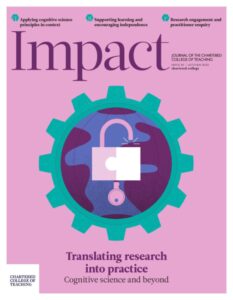Using feedback-driven metacognition to develop metacognitive skills in Year 9 Chemistry students
Written by: Deepika Narula

7 min read
Deepika Narula, Teacher of Chemistry, Beaumont School, UK
Students often feel that they have studied a lot for a test, yet they are not able to do well. Classroom teachers have experienced this at some point, and Agarwal and Bain (2019, p. 126, p. 129) found that students have an ‘illusion of confidence’ and incorrect ‘judgement of learning’ when they are revising. Students aren’t necessarily aware of efficient revision strategies like retrieval practice, spacing, etc. Rather, they rely more on rereading and making notes, giving them a false sense of confidence that they have the knowledge. With feedback-driven metacognition, students make judgements of their learning, retrieve information and receive feedback which informs them about the gaps in their knowledge (Agarwal and Bain, 2019; Koriat and Bjork, 2006). This approach can guide students to become reflective learners, informing them of their weaknesses and strengths and supporting them to take the next steps in their l
Join us or sign in now to view the rest of this page
You're viewing this site as a guest, which only allows you to view a limited amount of content.
To view this page and get access to all our resources, join the Chartered College of Teaching (it's free for trainee teachers and half price for ECTs) or log in if you're already a member.
- Agarwal PK and Bain PM (2019) Engage students with feedback‐driven metacognition. In: Powerful Teaching,1st ed. San Francisco: Jossey-Bass, pp. 123–152.
- Callender A, Franco-Watkins A and Roberts A (2015) Improving metacognition in the classroom through instruction, training, and feedback. Metacognition and Learning 11: 215–235.
- Education Endowment Foundation (EEF) (2018) Metacognition and self-regulated learning. Available at: https://educationendowmentfoundation.org.uk/education-evidence/guidance-reports/metacognition (accessed 1 November 2020).
- Koriat R and Bjork R (2006) Illusions of competence during study can be remedied by manipulations that enhance learners’ sensitivity to retrieval conditions at test. Memory & Cognition 35(5): 959–972.
- Miller T and Geraci L (2011) Training metacognition in the classroom: The influence of incentives and feedback on exam predictions. Metacognition and Learning, 6: 303–314.
- Rickey D and Stacy AM (2000) The role of metacognition in learning chemistry. Journal of Chemical Education 77(7): 915–920.
- Webb J (2021) The Metacognition Handbook. Woodbridge: John Catt Educational.
4.5
2
votes
Please Rate this content
Subscribe
Please login to comment
0 Comments
Oldest
Newest
Most Voted
Inline Feedbacks
View all comments










